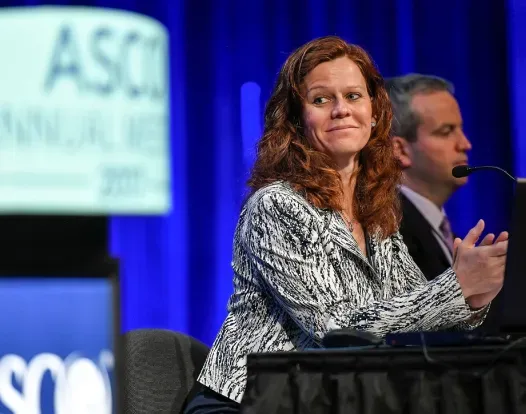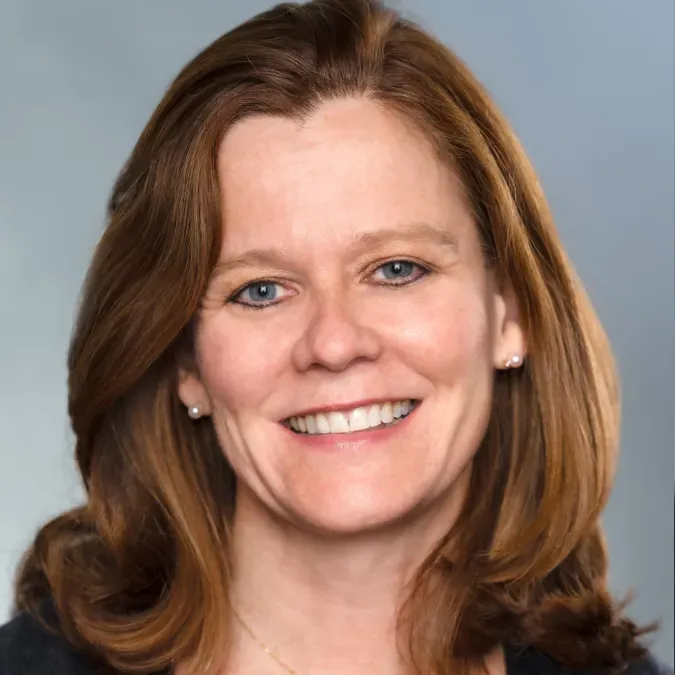These researchers have dedicated their careers to finding new treatments and cures for people with cancer.


Patient participation in clinical trials is vital to advancing cancer research. Too often, however, a communication breakdown occurs between the physician and the patient. The result? Too many patients may never fully understand the research they took part in or the outcomes it yielded.
Indeed, until recently, few oncology researchers shared trial results directly with the patients involved.
Communication problems like these are precisely what breast cancer oncologist Dr. Partridge, has long worked to resolve. Supported through the years by multiple grants from Conquer Cancer®, the ASCO Foundation, Dr. Partridge has dedicated much of her 25-year career to studying how to overcome the barriers standing between physician scientists, their patients, and optimal communication, including sharing clinical trial outcomes.
Making a Challenge Even Harder
Cancer is difficult enough on its own. But patients with breast cancer deal with challenges beyond the cancer itself. Between treatment decisions, concerns about hereditary risk, and finding socio-emotional support, these patients can be particularly vulnerable to the consequences of insufficient communication. On the other hand, when patients feel more informed and involved, they often prove better equipped to navigate their care and follow treatment recommendations.
Unfortunately, though, while the oncology community consistently shares research and trial outcomes amongst itself through presenting and publishing, the participants themselves often receive much less information. “Historically, we have rarely shared results directly with the patients who have given their time and trust to participating in research studies,” said Dr. Partridge, vice chair of medical oncology and the Eric P. Winer chair in breast cancer research at the Dana-Farber Cancer Institute. “It’s imperative that we develop interventions to make sure this important issue is addressed across the cancer care continuum, and in a sensitive manner.”
Doing so, she said, increases the possibility that patients not only potentially benefit from research in which they participate, but also feel appreciated and respected for their altruistic contributions.
Step 1: Surveying Researchers and Care Providers
In 2001, supported by a Conquer Cancer grant, Dr. Partridge launched an initial study to better understand the barriers to sharing trial results with patients. By searching clinical trial databases, Dr. Partridge and her team identified and surveyed oncologists across the nation who actively enrolled patients in clinical research. Survey participants were asked to give their perspectives on sharing research results with study participants.
“A key takeaway from this Conquer Cancer-funded research,” Dr. Partridge said, “was that oncologists and oncology nurses were willing to share research results in aggregate with study participants, but certain barriers existed that needed to be overcome.”
Initial data from this study informed the next steps in her research: evaluating patient perspectives on receiving clinical trial results, including how best to support them in understanding research outcomes.
Step 2: Finding Patterns in Patient Perspectives
Two years later, Dr. Partridge and her team expanded their research by evaluating oncologist and patient reactions to national clinical trial results on a then-emerging breast cancer treatment. Funded by another Conquer Cancer grant, they asked patients about the format in which they received the trial results, their preferences for receiving this information, and the potential impact it had on their understanding of breast cancer care.
Dr. Partridge and her colleagues found that most patients were interested in receiving trial results, but they wanted such information to be offered in a sensitive, easily digestible way. Some patients only preferred hearing results in-person, from their oncologist.
Additionally, Dr. Partridge found that patients were particularly interested in understanding how the research might affect their own care plans. Virtually all patients still wanted access to trial results, even if the results would not affect their treatment.
“What we learned from individual patients, and in aggregate, is that patients are very much interested in learning about research results, even if it won’t impact their future care,” Dr. Partridge said. “In fact, they even believe it’s a right.”
These findings, she continued, have informed efforts to routinely share results; demonstrated the importance of doing so in a careful and thoughtful way; and offered patients the support they need once they learn study results.
Step 3: Testing a Supportive Care Tool
Although her Conquer Cancer-funded studies focused on sharing clinical trial results with patient participants, Dr. Partridge took a different approach with her “Young and Strong” study, which was supported by a $1.35 million Improving Cancer Care Grant funded through the Conquer Cancer – Susan G. Komen Research Initiative.
From this project, which ran from 2010–2014, Dr. Partridge tested an educational intervention for young patients with newly diagnosed, early-stage breast cancer outside of a comprehensive cancer center to the community setting, where most young women with breast cancer receive treatment. The intervention was designed to address concerns surrounding fertility, genetics, and psychosocial care, all prominent issues for younger patients.
The primary focus of this study, Dr. Partridge explained, was to determine whether patients at sites with the young women’s intervention received more attention to these issues than patients at sites offering a control physical activity intervention. She found that patients benefited from both interventions, with most young participants reporting that concerns surrounding fertility and genetics were sufficiently addressed. The young women’s intervention did, however, notably increase attention to psychosocial support.
“Importantly, this intervention was deemed feasible, especially for addressing important issues facing younger patients and their providers. Both groups felt that it improved their care,” Dr. Partridge said. “This has led to our development of more refined education and supportive care interventions now being tested for younger patients with breast cancer and survivors.”
Prioritizing Patients in Cancer Care
As Dr. Partridge continues working to integrate these findings into standard oncology practice, she often speaks with her patients about the advancements in supportive care research over the past two decades. The gratitude they express, she said, keeps her motivated to keep strengthening patient-provider communication and ensuring all patients feel more involved in clinical research.
“When I have shared this work with my own patients, they are very appreciative of these efforts and are very much interested in learning about the trials in which they participate as well as other research findings that may help them,” Dr. Partridge said. “I'm grateful to be part of trying to further this important area of patient-researcher communications.”
The next steps in Dr. Partridge’s work include partnering with cooperative groups to make sharing research results with patients a standard part of the clinical trial process. She has also worked with patient advocates to develop tailored, programmatic resources to help ensure trial research can reach a more diverse range of patients, including those who belong to marginalized populations. When the most vulnerable patients can receive the support they need, she explained, every patient benefits.
“My Conquer Cancer grants allowed me to explore areas of research that had previously not been studied. Collectively, our work has shown the importance of improving patient-facing supportive care interventions and communications,” Dr. Partridge said. “I'm very grateful to Conquer Cancer for their support over the years to help us ensure patients receive better care and, hopefully, improved outcomes.”

